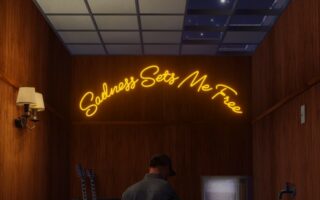 Bastille are named in homage to Bastille Day – the French National holiday celebrating the storming of Bastille prison in Paris on 14 July 1789 as a symbolic moment during the French Revolution, at a time which saw the oppressed peoples of the nation rise up against an autocratic government.
Bastille are named in homage to Bastille Day – the French National holiday celebrating the storming of Bastille prison in Paris on 14 July 1789 as a symbolic moment during the French Revolution, at a time which saw the oppressed peoples of the nation rise up against an autocratic government.
This political reference presently appears aptly aligned, in terms of the London quartet’s ability to disrupt the flow of largely auto-tuned vocals and uninspired dance floor filler dominating the modern day chart soundsphere, utilising a welcome cultured blend of powerfully affecting vocals and melodies that continue to linger long in the mind upon exposure.
Promising EPs have slowly trickled into the public consciousness to create an increasingly deafening buzz of music industry hype since the conception of the band in 2010 moved away from the initial solo project of lead singer and songwriter Dan Smith.
Their sound was carefully moulded to allow long awaited debut LP ‘Bad Blood’ to surface as a refined, in-depth musical equilibrium which marries character analysing darkened subject matter with instantly accessible pop hooks, potentially pleasing hardened purists and summer festival crowds alike.
The album launches with recent single ‘Pompeii’, immediately alerting the listener to the band’s passionate, earnest attitude, as choral cries of ‘eh-eh-eh-oh-eh-oh’ echo loudly, before we hear the first glimpse of Smith’s distinctive, swooping vocals, as capable in the softened, pensive lyrical verse as it is in the powerful, sky scraping chorus shouts of, ‘How am I gonna be an optimist about this?’. The conscious awareness of classical history – here displayed with the volcanic destruction of the ancient Roman city as a metaphor for listless youth – provides an intriguing observation for the well rounded lyrical sourcing in the songwriting at the band’s disposal.
‘Things We Lost In The Fire’ begins as a piano led ballad, before continuing the apocalyptic theme of fire-based destruction of possessions into ash, using a combination of tribal drumming and intermittent artificial electro-bell sounds in picking up the tempo as Smith exclaims of, ‘I was the match and you were the rock, maybe we started this fire’, act as the parting shot to a doomed relationship.
An exploration in sound shows a desire to experiment on ‘Bad Blood‘ – the first of three surviving tracks from early EPs. A decisively altered shift towards a reggae inspired techno beat comprises the intro, making way for stuttering synth backing and a rousingly anthemic chorus reminiscent of Mumford & Sons’ more fevered moments. Smith’s impassioned vocals plead with an old friend throughout to lay the cause of their resentment to rest, stating, ‘If we’re only ever looking back, we will drive ourselves insane’.
Mood levels lift with the optimistic ‘Overjoyed’; another familiar track from earlier releases. Smith’s voice stretches to near falsetto pitch when depicting experiences in the throes of lust during a relationship, using contrasting sombre piano to full effect throughout the track as a stripped back platform for a simplistic yet expressively connected tale of unwavering affection gained through means of basic communication.
‘These Streets’ further emphasises the use of a variety of tones and instruments, whether artificially created or otherwise, with a xylophone effect and handclaps weaving in between the vocals for an upbeat, exuberant African music stylised sound. ‘Weight of Living, Pt.II’ heightens the apparent theme of lively and urgent instrumentals at the midway stage, seeing the track as a wholly danceable song.
The Greek mythology inspired ‘Icarus’ begins with a hauntingly looming church choir hum, before a cantering drum beat leads into the ancient tale of flying too close to the sun with wings constructed from feathers and wax being used as a cunning self-destructive analogy for a young protagonist drinking himself to an early death due to perceived fears apparent in sober living.
‘Oblivion’ continues the questioning of the ageing process and what will become of us later in life, acting as a reflectively sobering piece complete with foreboding orchestral violins, while ‘Flaws’, another which long term fans have already been well acquainted, comes complete with pulsating electronic bleeps buried underneath a story of insecurity and exposing ones flaws so as to live without paranoia.
Spritely piano greets the listener on ‘Daniel in the Den’, containing impressive vocal harmonies and ever swelling, rumbling breakdowns. Songwriting references are not strictly confined to the pits of world history; with the swashbuckling ‘Laura Palmer’ offering a nod to cult American television serial drama Twin Peaks, before ‘Get Home’ closes the album with a mellowed ode to hazy recollection the morning after a heavy night out, pondering, ‘How am I gonna get back home?’
It would be difficult to find a band with such a weight of knowledge and ease in cultivating history to span out poignant analogies for the current struggles of youth in the modern age. This record will speak to many, but particularly young adults at that confusing stage of life where thoughts inevitably turn to how best to utilise your time on earth so as to grow old with few regrets.
‘Bad Blood’ is tangible proof that pop can still be heartfelt and thought provoking; setting the band apart from categorisation as a strictly guitar or synth driven band, thereby entering into a musical realm beyond conventional genres to stand on their own.
A well crafted and varied set of tracks make for a supremely encouraging debut where no song outstays its welcome.



